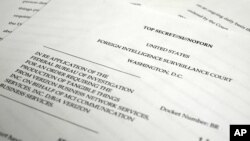According to an article in The Guardian, US phone communications giant Verizon was ordered to provide the National Security Agency 'metadata' on all calls going through its network, within the United States and with other countries. The collected 'metadata' does not contain actual conversations, but it still provides a lot of information that can be used in various ways.
The term "metadata" is composed of two words - Greek 'meta' meaning 'behind' and Latin 'data' meaning facts or details. So metadata refers to the 'data behind data'. In this particular instance it refers to the data embedded in the phone signal.
Metadata contains phone numbers, area codes, GPS data and time and duration of calls. It may also identify phone models and other technical information.
Once in the possession of the NSA the data can be stored in data warehouses - huge memory banks, where it can be analyzed and cross-referenced by sophisticated software which can decipher usage patterns.
The professional term is 'targeted data mining'. However, there is no evidence that collecting and analyzing it are effective tools.
In an interview with VOA, Elizabeth Goitein, co-director of the Liberty and National Security Program at the Brennan Center for Justice, says the NSA is collecting much more data than it needs.
"There's simply no way that those [data] are all relevant or necessary to an authorized investigation. So its' too broad," Goitein said.
She added that If the government wants to know who the suspected or known terrorist is communicating with, it can do that by getting the telephone records of the individuals it wants to investigate.
Without confirming the story, a senior Obama administration official on background defended the practice as part of the provisions of the Patriot Act, the law passed by Congress after the 2001 terrorist attacks on the U.S.
The term "metadata" is composed of two words - Greek 'meta' meaning 'behind' and Latin 'data' meaning facts or details. So metadata refers to the 'data behind data'. In this particular instance it refers to the data embedded in the phone signal.
Metadata contains phone numbers, area codes, GPS data and time and duration of calls. It may also identify phone models and other technical information.
Once in the possession of the NSA the data can be stored in data warehouses - huge memory banks, where it can be analyzed and cross-referenced by sophisticated software which can decipher usage patterns.
The professional term is 'targeted data mining'. However, there is no evidence that collecting and analyzing it are effective tools.
In an interview with VOA, Elizabeth Goitein, co-director of the Liberty and National Security Program at the Brennan Center for Justice, says the NSA is collecting much more data than it needs.
"There's simply no way that those [data] are all relevant or necessary to an authorized investigation. So its' too broad," Goitein said.
She added that If the government wants to know who the suspected or known terrorist is communicating with, it can do that by getting the telephone records of the individuals it wants to investigate.
Without confirming the story, a senior Obama administration official on background defended the practice as part of the provisions of the Patriot Act, the law passed by Congress after the 2001 terrorist attacks on the U.S.





